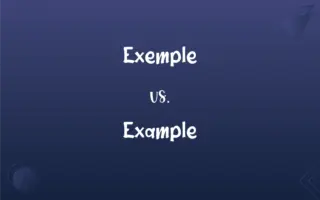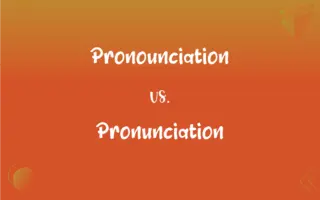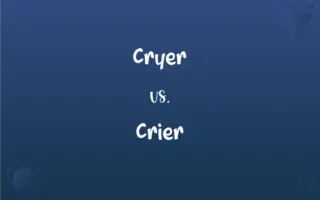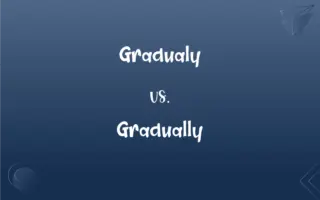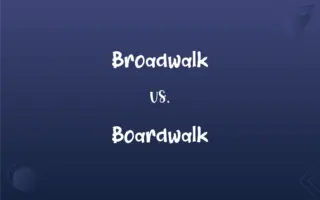Haveing vs. Having: Mastering the Correct Spelling
Edited by Aimie Carlson || By Janet White || Updated on March 12, 2024
"Haveing" is an incorrect spelling. "Having" is the correct form, representing the present participle of the verb "have".

Which is correct: Haveing or Having
How to spell Having?

Haveing is Incorrect

Having is Correct
ADVERTISEMENT
Key Differences
No English word with a silent “e” retains the “e” before “-ing”. Drop the "e" and add "-ing".
Remember, "have" becomes "having" just like "make" becomes "making".
Words ending with "ve" typically drop the "e" before adding "-ing".
Think of the base verb "have" and simply add "-ing".
Visualize "having" as "hav(e)-ing", noting the dropped “e”.
ADVERTISEMENT
Correct usage of Having
He is haveing trouble with his homework.
He is having trouble with his homework.
Are you haveing any luck finding your keys?
Are you having any luck finding your keys?
She was haveing a great time at the party.
She was having a great time at the party.
I am haveing a hard time understanding this.
I am having a hard time understanding this.
They were haveing dinner when the phone rang.
They were having dinner when the phone rang.
Having Definitions
Experiencing or undergoing a particular situation.
They are having a great time at the carnival.
To eat or drink.
We are having dinner at 8pm.
To give birth to or to produce.
She is having a baby next month.
To be in possession of
Already had a car.
To possess as a characteristic, quality, or function
Has a beard.
Had a great deal of energy.
To possess or contain as a constituent part
A car that has air bags.
To occupy a particular relation to
Had many disciples.
To possess knowledge of or facility in
Has very little Spanish.
To hold in the mind; entertain
Had doubts about their loyalty.
To use or exhibit in action
Have compassion.
To come into possession of; acquire
Not one copy of the book was to be had in the entire town.
To receive; get
I had a letter from my cousin.
To accept; take
I'll have the peas instead of the spinach.
To suffer from
Have defective vision.
To be subject to the experience of
Had a difficult time last winter.
To cause to do something, as by persuasion or compulsion
Had my assistant run the errand.
To cause to be in a specified place or state
Had the guests in the dining room.
Had everyone fascinated.
To permit; allow
I won't have that kind of behavior in my house.
To carry on, perform, or execute
Have an argument.
To place at a disadvantage
Your opponent in the debate had you on every issue.
(Informal) To get the better of, especially by trickery or deception
They realized too late that they'd been had by a swindler.
(Informal) To influence by dishonest means; bribe
An incorruptible official who could not be had.
To procreate (offspring)
Wanted to have a child.
To give birth to; bear
She's going to have a baby.
To partake of
Have lunch.
To be obliged to; must
We simply have to get there on time.
Used with a past participle to form the present perfect, past perfect, and future perfect tenses indicating completed action
The troublemaker has gone for good. I regretted that I had lost my temper. They will have finished by the time we arrive.
One enjoying especially material wealth
"The gulf widens between the feast of the haves and the famine of the have-nots" (Salman Rushdie).
Present participle of have
The act of possessing; ownership.
Something owned; possession; goods; estate.
(obsolete) A person's behaviour.
Good manners.
(obsolete) Grasping; greedy.
Possession; goods; estate.
I 'll lend you something; my having is not much.
Possessing or owning something.
She regrets not having a backup plan.
Used to indicate a relationship.
John, having the highest score, won the game.
Having Sentences
She is having a birthday party next week.
Are you having fun at the amusement park?
They are having a meeting in the conference room.
He's having difficulty solving the math problem.
The teacher is having a talk with her students.
I'm having second thoughts about moving to the city.
My brother is having a baby girl.
You're having a good hair day.
Our neighbors are having a garage sale.
We're having a barbecue this weekend.
We're having guests over tonight.
The chef is having a moment of inspiration.
I'm having an allergic reaction.
He's having surgery next month.
I'm having issues with my computer.
I'm having a coffee break.
Are you having a problem with your phone?
You're having a great game today.
They're having a debate in class.
She's having a nap.
He's having the time of his life on vacation.
They're having a picnic in the park.
She's having a hard time picking a dress for the prom.
She's having doubts about her decision.
They're having a wonderful holiday.
Having Idioms & Phrases
Having a ball
Having a great time.
The kids were having a ball at the playground.
Having a fit
Showing anger or irritation.
My mom had a fit when she saw the mess in the kitchen.
Having a blast
Enjoying oneself greatly.
They were having a blast at the beach.
Having a go
Trying or attempting something.
He's having a go at baking a cake for the first time.
Having a mind of its own
Behaving unpredictably or uncontrollably.
This computer is having a mind of its own today.
Having a field day
Taking advantage of a situation to achieve a lot.
The media had a field day with the celebrity scandal.
Having a moment
Experiencing a brief period of fame or attention.
The singer is really having a moment right now.
Having a say
Being allowed to express one's opinion.
Everyone in the meeting will have a say.
Having a heart
Being compassionate or empathetic.
She's always having a heart for stray animals.
Having a look
Examining or inspecting.
Could you have a look at my car? It's making a strange noise.
Having a laugh
Joking or not being serious.
Are you just having a laugh, or do you really want to quit your job?
FAQs
What is the root word of Having?
The root word is "have".
Which vowel is used before Having?
Typically "a" as in "a having".
What is the pronunciation of Having?
It's pronounced as /ˈhævɪŋ/.
What is the verb form of Having?
The base verb form is "have".
What is the plural form of Having?
Not applicable.
Which conjunction is used with Having?
"And" can be used, but it depends on the context.
Is Having an abstract noun?
Not typically, but as a gerund, it represents the action or concept of possession.
Is Having a negative or positive word?
Neutral. The connotation depends on the context.
Is Having a noun or adjective?
Primarily a verb, but can also be a gerund (noun form).
Why is it called Having?
It's called "having" as it's the present participle form of the verb "have", indicating possession or occurrence.
Is Having an adverb?
No.
Is Having a vowel or consonant?
"Having" is a word, not a single letter.
Is Having a countable noun?
No.
Is the word Having imperative?
No.
How many syllables are in Having?
Two syllables.
What part of speech is Having?
It's primarily a verb but can also act as a gerund (noun form).
What is the third form of Having?
Also "had".
What is the singular form of Having?
"Having" does not have a singular or plural form since it’s a verb form.
Which preposition is used with Having?
Depends on the context, but "of" is common as in "having of resources".
What is the opposite of Having?
Lacking.
What is the second form of Having?
"Had".
What is a stressed syllable in Having?
The first syllable, "Hav".
Is the Having term a metaphor?
Not in itself, but can be used in metaphoric contexts.
What is another term for Having?
Possessing or owning.
What is the first form of Having?
"Have".
How is Having used in a sentence?
"She is having a tough time understanding the concept."
Which article is used with Having?
Both "a" and "the" can be used, but "having" typically doesn't require an article unless used in a specific context.
Is Having a collective noun?
No.
How do we divide Having into syllables?
Hav-ing.
Which determiner is used with Having?
"This" or "that" can be used, among others, depending on the context.
About Author
Written by
Janet WhiteJanet White has been an esteemed writer and blogger for Difference Wiki. Holding a Master's degree in Science and Medical Journalism from the prestigious Boston University, she has consistently demonstrated her expertise and passion for her field. When she's not immersed in her work, Janet relishes her time exercising, delving into a good book, and cherishing moments with friends and family.
Edited by
Aimie CarlsonAimie Carlson, holding a master's degree in English literature, is a fervent English language enthusiast. She lends her writing talents to Difference Wiki, a prominent website that specializes in comparisons, offering readers insightful analyses that both captivate and inform.

























